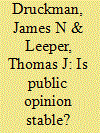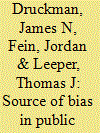| Srl | Item |
| 1 |
ID:
121024


|
|
|
|
|
| Publication |
2012.
|
| Summary/Abstract |
Public opinion matters, both as a central element of democratic theory and as a substantive foundation for political representation. The origins and nature of public opinion have long attracted the attention of social scientists. Yet a number of questions remain; among the more perplexing is whether-and under what conditions-public opinion is stable. The answer depends in large part on whether one looks at aggregations of individual opinions (macro public opinion) or at the individual opinions themselves (micro public opinion). In this essay, we explore the macro/micro divide and offer a framework to determine when opinions are likely to be stable or volatile. This framework reflects both the content of the political environment and the nature of individuals' opinions. Using public opinion dynamics surrounding the Patriot Act as a primary example, we discuss the role of opinion stability in interpreting public opinion and in understanding the normative implications of public preferences.
|
|
|
|
|
|
|
|
|
|
|
|
|
|
|
|
| 2 |
ID:
113560


|
|
|
|
|
| Publication |
2012.
|
| Summary/Abstract |
A long acknowledged but seldom addressed problem with political communication experiments concerns the use of captive participants. Study participants rarely have the opportunity to choose information themselves, instead receiving whatever information the experimenter provides. We relax this assumption in the context of an over-time framing experiment focused on opinions about health care policy. Our results dramatically deviate from extant understandings of over-time communication effects. Allowing individuals to choose information themselves-a common situation on many political issues-leads to the preeminence of early frames and the rejection of later frames. Instead of opinion decay, we find dogmatic adherence to opinions formed in response to the first frame to which participants were exposed (i.e., staunch opinion stability). The effects match those that occur when early frames are repeated multiple times. The results suggest that opinion stability may often reflect biased information seeking. Moreover, the findings have implications for a range of topics including the micro-macro disconnect in studies of public opinion, political polarization, normative evaluations of public opinion, the role of inequality considerations in the debate about health care, and, perhaps most importantly, the design of experimental studies of public opinion.
|
|
|
|
|
|
|
|
|
|
|
|
|
|
|
|